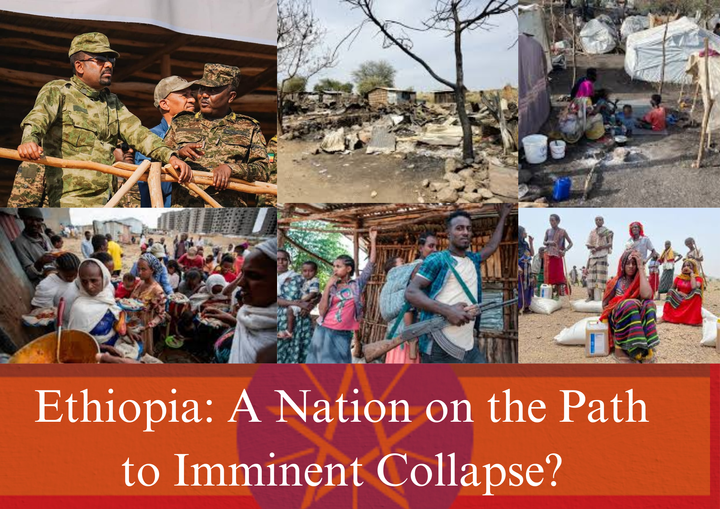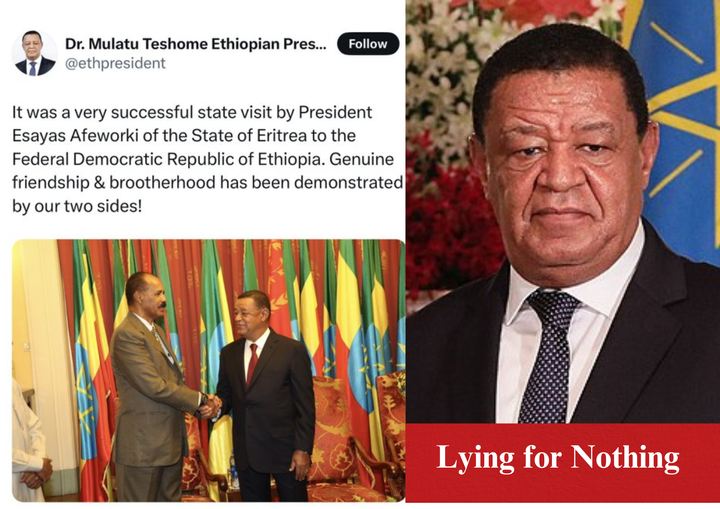President Isaias Afwerki's Diplomatic Engagement Marks Turning Point in Eritrea-Italy Relations
President Isaias Afwerki's Diplomatic Engagement Marks Turning Point in Italy-Eritrea Relations. Post-WWII Impact, Italy's Role, Eritrea's Strength, Italy-Africa Summit, Strategic Advantage, Belt and Road Initiative, Global Engagement, Historical Agreement

Amanuel Biedemariam Februray 16, 2024
Introduction: This article delves into the intricate historical dynamics between Italy and Eritrea post-World War II, shedding light on the profound impact of Italy's defeat and subsequent actions on Eritrea's social, economic, and political landscape. From establishing the British Military Administration to contemporary diplomatic relations, the narrative navigates through decades of evolving relationships, power struggles, and the enduring resilience of the Eritrean people. It also examines recent developments, such as Eritrea's participation in the Italy-Africa Summit, offering insights into prospects and the potential for renewed engagement between the two nations.
President Isaias Afwerki's Diplomatic Engagement Marks Turning Point in Eritrea-Italy Relations
In the aftermath of WWII, Italy suffered defeat, resulting in Eritrea coming under the control of the US-Britain Allied forces, thereby ending the six-decade-long colonial rule in Eritrea. Subsequently, the British Military Administration(BMA)was set up to govern Eritrea. The BMA significantly changed Eritrea's institutions, governance, and infrastructure during this period. They aimed to establish a U.S. military presence in Eritrea and introduce a federation program with Ethiopia. In the process, the BMA dismantled and looted much of the Italian-built infrastructure. This move had a significant impact on Eritrea's social and economic landscape. While these things took place, Italy lost its influence and control over Eritrean affairs, including the decision to federate Eritrea with Ethiopia, against the will of the Eritrean people.
The post-WWII period marked a significant shift, laying the groundwork for intricate relationships in Italy's relations with Eritrea until today. Italy grappled with a reshaped global landscape, profoundly impacting its diplomatic ties.
Under the leadership of the United States and Britain, the triumph of the Allied forces propelled France and Great Britain into a prominent international role as part of the U.S. security architecture in shaping the future of Africa. Italy found itself sidelined, with no voice in the affairs of its former colonies. To exacerbate the situation, Italy was forced to acquiesce to whatever demands the U.S. and its allies imposed, particularly concerning Eritrea and its future.
The visit of President Isaias and the Eritrean delegation to the Italy Africa Summit, along with their 10-day stay in Italy, placed a necessary focus on the complex relationship between Italy and Eritrea. Italy's defeat in World War II played a significant role in shaping this relationship, intricately woven into the post-war geopolitical dynamics.
During the decade-long British Military Administration, following the Federation of Eritrea in 1952 and its subsequent annexation by Haile Sellassie in 1962, Eritrea endured persecution, pillaging, and murder under various Ethiopian administrations. In the aftermath of Ethiopia's control, the Italian people and government forgot Eritrea, their historical role, and the people.
Eritreans faced tremendous hardships, death, and displacement during the struggle for independence, while Italy chose to align itself with Ethiopia. This was further complicated by Italy's involvement in the U.S. security architecture, which tied it to NATO and the European Union directives. Unfortunately, this meant that Italy worked against the people it had colonized for decades.
Ethiopia was a crucial link for the United States in Africa and the surrounding areas such as the Horn of Africa, the Middle East, and the Red Sea. As a result, Ethiopia was given a preferred status and provided with the necessary support to continue its war against Eritrea. This arrangement continued for more than three decades.
After gaining de facto independence in 1991, Italy officially recognized Eritrea in 1993 and established diplomatic relations between the two countries. However, Italy did not contribute to Eritrea's development and often worked against it. In the conflict between Eritrea and Ethiopia initiated by TPLF in 1998, Italy often supported the interests of Ethiopia and the United States, ignoring its historical injustices towards Eritrea spanning several decades.
Italy, in collaboration with Ethiopia and its Western allies, including the U.S. and E.U., actively pursued a regime change agenda against the government of Eritrea to undermine its sovereignty. This concerted effort involved Ambassador Antonio Bandini, who, as the E.U. representative in Eritrea, applied pressure on the Eritrean government in a bid to overthrow its leadership. Consequently, the Eritrean government requested the departure of the Italian ambassador from Asmara in October 2001. The Italian foreign ministry in Rome contended that Eritrea was singling out Italy for retribution, citing Italy's historical role as a former colonial power in the region.
From 2001 until very recently, Italy consistently opposed Eritrea's interests, aligning itself with the U.S. and its allies as Eritrea endured prolonged hardship, subjugation, sanctions, and isolation. Historical records show no evidence of Italy publicly supporting Eritrea; rather, Italy actively participated in campaigns to vilify Eritrea, as well as in depopulation efforts aimed at Eritrean youth, regime change endeavors, and other undermining activities. These actions led to the displacement of thousands of Eritreans and the loss of countless lives, many of which remain unaccounted for in the Mediterranean Sea. The tragic events in Lampedusa and the subsequent handling of the situation by Italian authorities serve as a poignant reminder of the severe mistreatment endured by Eritreans over decades. A group of Eritrean activists who visited Lampedusa documented the activities of the Italian authorities.
Given this context, the historical narrative becomes crucial in navigating Eritrea's relations with Italy. Against the backdrop of Eritrea-Italy relations, the recent Italy-Africa Summit in Rome marks a significant milestone, presenting Italy with an opportunity to rectify historical narratives.
The Italian government hailed the summit as a "Historic Meeting," marking it the most significant gathering in 200 years. Prime Minister Giorgia Meloni underscored a fresh approach to fostering mutually beneficial cooperation between Italy and African nations, departing from Europe's historical "paternalistic" stance towards Africa. Italy's commitment extends to funding Energy and Infrastructure projects, spanning key areas such as energy, education, healthcare, and agriculture, to foster development in African nations.
A primary focus within Italy's agenda is Migration Control. In exchange for its investments, Italy seeks commitments from African nations to address irregular boat crossings in the Mediterranean. This strategy aligns with Italy's broader goal of investing in African nations, a necessity highlighted by Europe's increased needs following the Ukraine conflict. Sanctions against Russia disrupted the flow of Russian resources to Europe, prompting Italy and other major European economies to explore alternatives in Africa.
Through investments in these nations, Italy aims to contribute to infrastructure development, enhance security conditions for its investments, and establish a sustainable source of resources, particularly in the energy sector.
Eritrea fits this narrative, especially considering the situation in Yemen, which is causing economic disruptions to Western economies. Located north of Djibouti and controlling the entry to the Bab al-Mandeb, Eritrea plays a crucial role in the future of various European resources and energy supplies. Stabilizing the region and developing its economies can create strong economic partnerships.
Despite relentless efforts by Western nations to isolate Eritrea over the decades, the nation has emerged as a de facto center of gravity in the region, wielding significant influence in key countries. Eritrea's steadfast relations position it as a beacon of peace, offering a valuable resource for Europe to leverage. The people of Eritrea have endured immense sacrifices to attain this position, underscoring their resilience and determination. Eritrea now stands from a position of strength, ready to engage constructively on the regional and international stage.
Eritrea's attendance at the Italy-Africa Summit presented a prime opportunity to forge fresh relations with its former colonizer, Italy, from a standpoint of robustness and assurance. This moment holds particular significance, given Eritrea's integration into the Belt and Road Initiative (BRI) and its positive relations with influential players like Russia, China, and other global powers eager to tap into Africa's potential. Eritrea is positioned with a strategic advantage, ready for substantial engagement on the global platform.
According to EriTV reports, President Isaias and his delegation attended the Africa-Italy Summit in Rome, seizing the opportunity the invitation extended by the Italian Government provided. The summit aimed to cultivate equitable partnerships across various sectors, including economy, infrastructure, food security, energy security, transition, and vocational training and culture.
Accompanied by a distinguished delegation, including Mr. Osman Saleh, Minister of Foreign Affairs, Ambassador Zemede Tekle, Commissioner of Culture and Sports, the Eritrean Delegation engaged in extensive discussions during the visit. President Isaias participated in meetings with Italian ministers and corporate leaders, focusing on enhancing investment and cooperation efforts.
The visit spanned 12 days, during which President Isaias actively participated in numerous events and dialogues. His primary objectives included strengthening bilateral relations, exploring economic opportunities, and fostering cultural exchange between Eritrea and Italy.
A notable highlight of the visit was the agreement between the governments of Eritrea and Italy to document the experiences of Eritreans forced to participate in Italy's wars. Eritrea aims to archive these records and establish a center in their honor, commemorating their contributions to Eritrean and Italian collective history.
Select Concierge Travel and Adulis Travel have merged their offerings to deliver group tour packages, encompassing airfare for parties of twenty or more to depart and return collectively to your chosen destinations. Limited slots are available. Secure your spot by clicking here. Tours are scheduled from May through late August. Click Here to Fill Out a Form




Comments ()